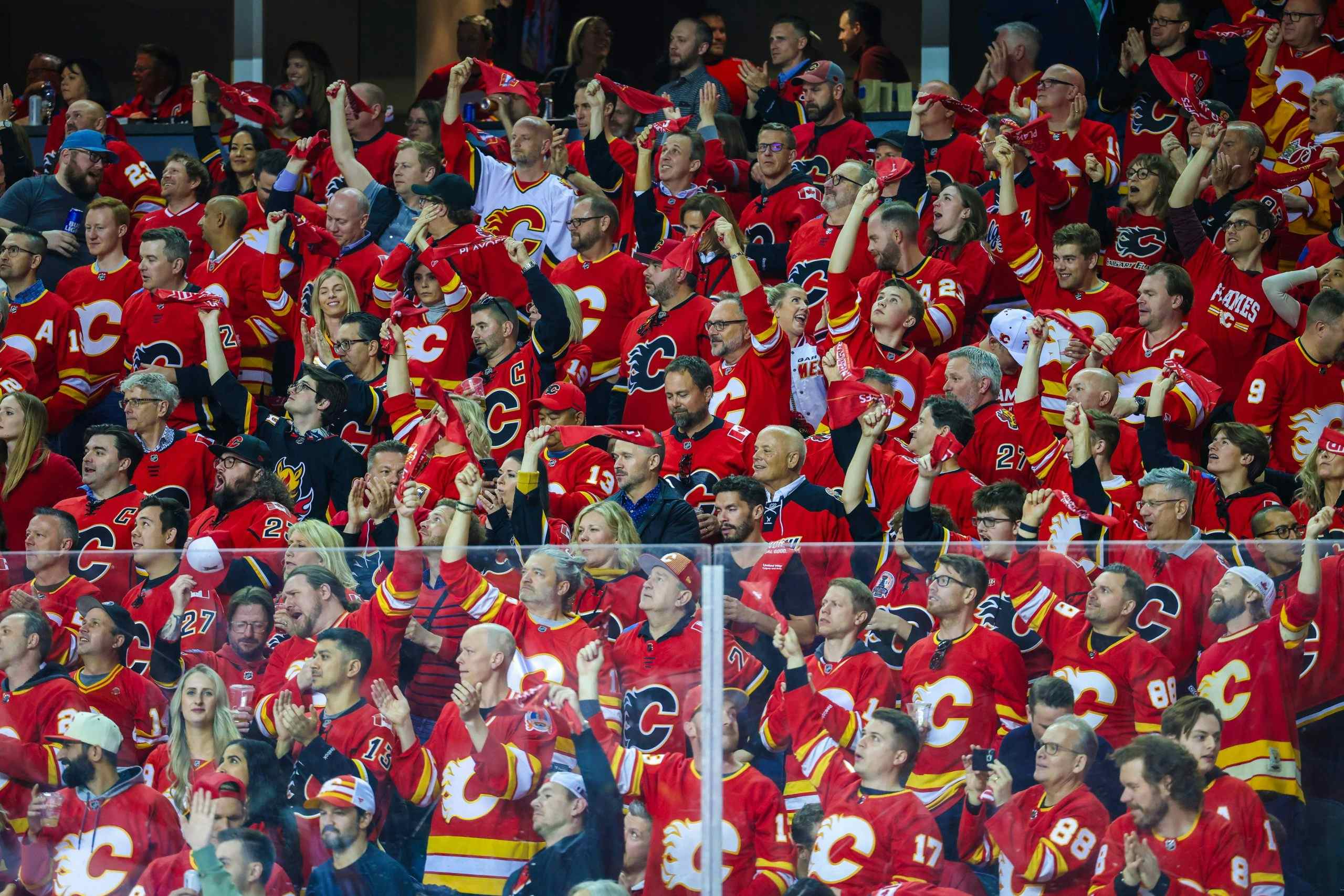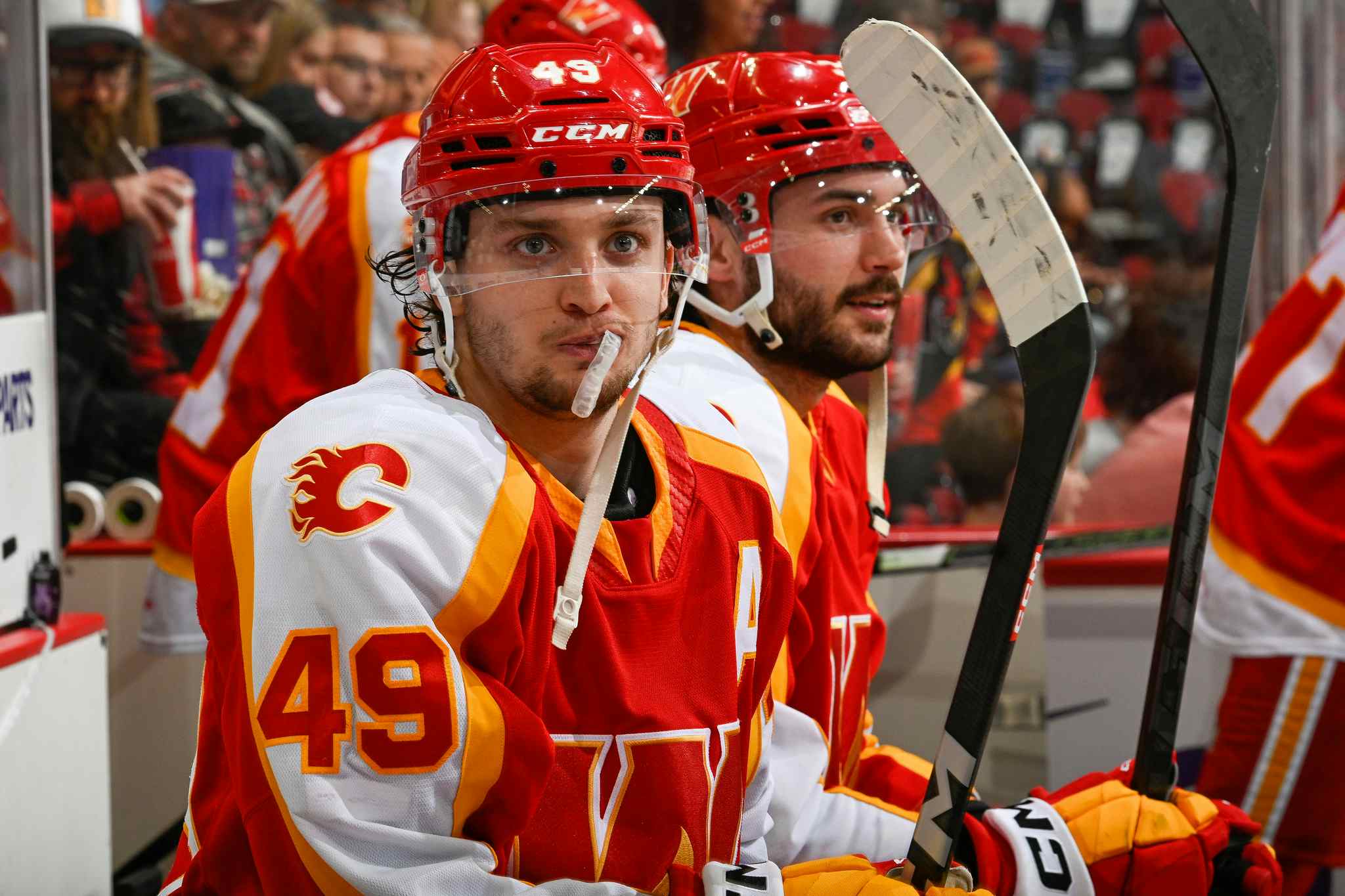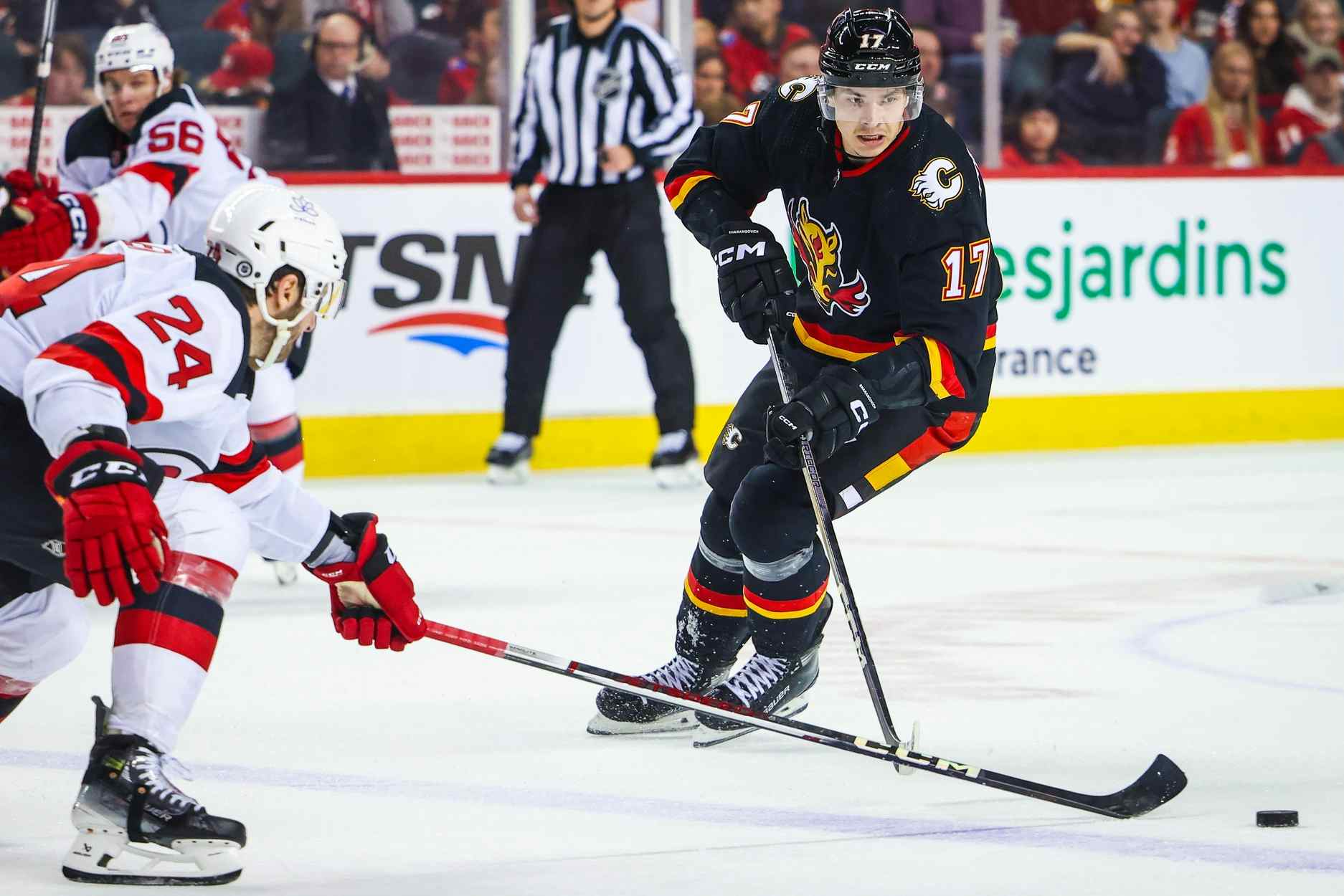Johnny Gaudreau, 99 games played, and his path to NHL stardom
By Ari Yanover
8 years agoTomorrow, Johnny Gaudreau is going to play his 100th NHL game. He enters it with 29 goals, 53 assists, and 82 points: a .83 point per game pace, the highest in his draft class with at least 50 games played.
Of the 211 players picked in the 2011 NHL entry draft, Gaudreau is the 24th player to reach 100 games. He’s 12th in scoring. It’s entirely likely he passes most of the players ahead of him. And he was picked 104th overall.
Players picked in the later rounds don’t tend to make the show, let alone become one of the best players on their team, en route to becoming one of the top players in the NHL. Johnny Hockey, though? He’s well on his way.
The draft
The NHL draft is met with a lot of fanfare – in the first round. There’s a lot of pomp and circumstance, with draft picks being paraded up on stage, getting their new jerseys and posing for pictures before being whisked away to take care of all sorts of media business. It takes about three hours to go through 30 kids.
The following day, it takes about three hours to go through another 180, many of whom won’t even be there. The NHL speeds through picks, teams announcing a single name before moving on to the next one. It’s rapid fire, and it passes right on by. If the kid selected is in the building, he’ll go on down to his team’s table; if not, well, he doesn’t get that moment.
Johnny Gaudreau was one of those kids who did not get his moment. Rather than be in the Twin Cities, he was in Turnersville, NJ, playing hockey when the 100th pick of the 2011 draft was selected by the Toronto Maple Leafs: Tom Nilsson. At 101st, the Vancouver Canucks took Joe Labate. Yannick Veilleux’s name was called by the St. Louis Blues at 102nd overall, and the Carolina Hurricanes wanted Gregory Hoffman at 103rd.
Finally, 47 picks after their last one – a defenceman from the Portland Winterhawks named Tyler Wotherspoon – it was the Calgary Flames’ turn once again. They called Johnny Gaudreau’s name, and as his physical stats – listed as a 5’6, 137 lb. 17-year-old – flashed up on the jumbotron, you immediately knew two things about him:
- He was tiny, and therefore, probably going to play four years in the NCAA.
- He was tiny, but because he was selected, there was no doubt he had to be insanely skilled.
The Flames had been selecting smaller players all draft – Wotherspoon was of decent size, but Sven Baertschi and Markus Granlund were sub-6’0 forwards – but none compared to Gaudreau, who was hailed as potentially the most skilled player of his draft class, but too small to do anything with that talent.
After all, if you’re big, you have to prove that you can’t play. If you’re small, you have to prove that you can.
And sure, Gaudreau had proven he could play – in the USHL. His 72 points in 60 games led the Dubuque Fighting Saints, and had him good for fourth in overall USHL scoring. But 137 lbs? That’s cute, and you’re not going to make it professionally with that.
Though Gaudreau was quick to point out his listed physical stats weren’t the correct ones – he claimed to be 5’9, 148 lbs, which is still pretty small, but not as drastically so as it originally seemed – the draft, uncaring in the later rounds, passed him by. The Dallas Stars selected Emil Molin 105th overall, the New York Rangers went with Michael St. Croix at 106th, and Johnny Gaudreau’s name was just another on a very long list.
The development years
While Gaudreau’s name was yet to elicit league-wide recognition, Calgary certainly knew who he was. He was interesting because he was so small, and then he was interesting because it turned out he had incredible talent – and was showing it off in his new NHL home city for the first time.
Back then, it was a question if he’d ever be an NHLer. It wasn’t due to his skill set, though; it was entirely due to his size. But he was just a fourth round pick: a low risk, high reward project the Flames could afford to take their time with and simply hope would pan out for the best. The road ahead of him was going to be long, but maybe, just maybe, this kid would be able to do it.
He ended up going to Boston College, a school that had some history in developing smaller players and turning them into NHLers (although it should be said that Nathan Gerbe not only does not have the skill Gaudreau does, but he has the weight Gaudreau does not; he turned into a serviceable bottom six player). Gerbe, only about three years removed from BC when Gaudreau committed, was pointed to as a decent enough benchmark, though.
In Gerbe’s freshman year, he scored 18 points over 39 games: not bad. In Gaudreau’s freshman year, he scored 44 points over 44 games, second in scoring on the team that won the Frozen Four title that year. All eyes were officially on him, and whilst excitement in Calgary grew, so did the pressure for Gaudreau to prove his year wasn’t a fluke.
He responded by scoring 51 points in 34 games, leading BC in scoring and tying for fourth in the NCAA overall. He also helped the United States to a gold medal at the 2013 World Juniors, his final year of eligibility for the tournament, by leading Team USA in scoring with seven goals and nine points over seven games, and was named to the tournament’s All-Star Team as a result. He was a finalist for the Hobey Baker, too, but didn’t win.
Each time, Gaudreau returned to Calgary for development camp, and each time, the city grew more and more convinced this kid would be in the NHL. Thanks to Texas A&M’s Johnny Football, Johnny Hockey became a thing, and BC was equally as in love with him. By the time Gaudreau was entering his junior year, it was less of a question if he could repeat his previous seasons, and more what he’d do to impress this season.
Throughout the hockey world, it was also a question of if he could do what he was doing in the NCAA at the NHL level. Being one of the best college hockey players of recent times was impressive, but it wasn’t like he was playing against the best in the world, and who knew if he could even stand up to the heaviest hitters the top professional league had to offer.
Gaudreau responded by scoring 80 points over 40 games in his third year, annihilating all competition along the way. Two points per game over a full NCAA season, 15 more points than the next highest scorer, 23 more than the guy in third place. He won the Hobey Baker, and was officially done at the college level, with nothing left to prove.
He joined the destitute 2013-14 Calgary Flames for their final game of the season: a team a broken shell of its former self, with all its previously established stars officially gone, slinking off into the sunset after one last game, not to be seen again until the following October. He scored his first goal on his first shot.
And then he joined the Americans once again for the World Championships, and was second in scoring with 10 points over eight games.
The rookie season
With Gaudreau officially a professional hockey player, questions still persisted. There was no way he was going to be able to play effectively at the NHL level, right? Sure, he was listed as 5’9 and 150 lbs, but that’s tiny. He would get killed out there.
At least put him in the AHL first. Maybe he’d go back and forth between the two leagues as he worked to establish himself, if he even could. Because even though Calgary was saying – no, seriously, listen to us, we’ve been following him hardcore since 2011, we’ve been tracking him and watching him longer than you and he without question has the talent to be a star – scepticism abounded through the rest of the hockey world.
Yes, college was impressive. But the NHL is better, bigger.
And initially, detractors appeared to be correct. He barely played over the first five games of the season, registering just one shot on net and failing to so much as put a single point on the board. The Johnny Hockey moniker was spit on, an ignorant perception of arrogance labeling him a kid too bring for his britches to waltz into the best league in the world calling himself that (even though that is not how things transpired, and certainly not by his choice). There was speculation, calls for him to be sent down to the AHL, because he just wasn’t cutting it at the highest level possible.
Every time Gaudreau had gone up a level – from USHS to USHL, from USHL to NCAA – he had thrived, and he had succeeded. Every single time, without fail. But the NHL was finally going to be the league to beat him.
And on the Flames’ sixth game of the 2014-15 season, he was scratched.
On the seventh game, he returned to the lineup, and he scored a goal and an assist. A couple of games later, more multi-point games. A couple more, and he had a three-pointer. After his rough start, he was starting to approach a point-per-game status, as long as you discounted those first five trial runs.
Any thoughts of the AHL dissipated. Johnny Hockey was no longer a question, but a title. Cries of Gaudreau’s inability to perform at the NHL level were silenced, permanently. And then he scored a natural hat trick to drag his team up from the depths of a 3-0 deficit in his 36th NHL game, just to make sure the message stuck.
Gaudreau was neck-in-neck alongside Filip Forsberg for the rookie scoring lead once he took off, and eventually, he passed him, only to have a surging second-half Mark Stone catch up with, and ultimately, tie him: 64 points in 80 games, a .80 point per game pace (.85 if you discount those first five adjustment period games). He finished his regular season second in team scoring and a Calder finalist, and finished his post-season with nine points over 11 games, second in rookie playoff scoring (losing out to Teuvo Teravainen, who scored one more point over seven additional games).
He was never a guarantee to play the entire 2014-15 season in Calgary, although there was an inkling he would from those who followed him. Gaudreau didn’t just play a full season in the NHL, though: he announced his presence as a force to be reckoned with, size be damned.
Today
Questions are just about done persisting Johnny Gaudreau by this stage of his career. Every time he’s gone up a level, it’s been a concern whether or not he’d be able to play in it; every time he’s gone up a level, he hasn’t just performed, but he’s dominated. It took him three years to grab the NCAA by force, but he was a recognizable threat from year one.
The same thing has happened at the NHL. It’s no longer, “Can Johnny Gaudreau play at the NHL level?” Now, it’s, “Just how high can he go?”
Gaudreau has kicked off his sophomore season with 17 points over 18 games, good to easily top his Calgary Flames teammates, as well as be in a tie for sixth overall in NHL scoring. It’s not uncommon to see him as the best forward on the ice now, playing alongside more experienced linemates he appears to have risen above. And there’s still no telling what his ceiling really is.
Curiosity has followed Gaudreau ever since he was drafted, with the hometown fans convinced from early on he would be just the player the Flames needed, and outsiders a mix of derision, scepticism, and cautious excitement.
He ended up playing in Calgary at just the right time. He never got to play alongside Jarome Iginla, the then-face of the Flames franchise having been traded away a year prior. The team was reeling, hoping an exciting rookie season from Sean Monahan would be the sign of better things to come for a franchise no longer with a superstar, no longer with a recognizable presence to strike fear into the oppositions’ hearts with just what he could do to them.
Johnny Gaudreau stepped onto Saddledome ice, and he became that force.
And it hasn’t even been 100 games yet.
Tomorrow, it will be. It’s not a bad number for a kid initially seen as far too small to ever compete against the best the world has to offer, let alone begin to rise up into their ranks.
One hundred is such a small number, though. It’s definitely too small for Gaudreau.
It’s year two, and he’s just getting started.
Recent articles from Ari Yanover





